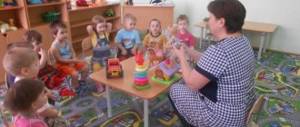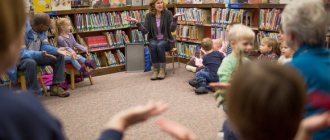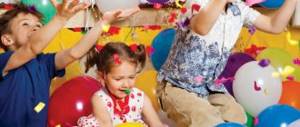Modern forms of working with parents to introduce preschoolers to fiction
Family and family reading play a paramount role in introducing a preschooler to fiction.
What problems does a modern family face in terms of introducing children to literature?
Currently, the family is in a state of crisis, and due to a number of objective reasons, its influence on the formation of the child as a future reader is difficult. This process is not facilitated by the low pedagogical literacy of many parents, the difficult financial situation of families, and the lack of due attention on the part of parents to the process of developing a child’s interest in children’s literature. Modern children spend more and more time playing computer games and watching TV. Some parents, making attempts to introduce their child to reading, are faced with the problem of holding the child’s attention and the inability to interest the preschooler in the plot of the work. As a result, they leave this activity, believing that the child is simply not interested. Often parents believe that reading books to a child is fun, a child's pastime. They rarely read books to children due to lack of time and busyness, hastily. It happens that parents do not buy books at all or buy books that do not correspond to the age capabilities of the child.
Organizing interaction between teachers and parents in this direction will help change the current situation.
The main goal of this interaction: to help parents realize the value of reading books to their children as a means of education and upbringing of preschoolers.
The tasks in organizing family reading are as follows:
‒ to acquaint parents with the age characteristics of preschoolers in terms of perception of works of children's fiction and educational literature
‒ involve families in a reading environment
‒ expand their understanding of children's literature
‒ introduce parents to different types of home reading, taking into account the interests and needs of preschoolers
‒ to teach parents how to guide the upbringing of children as future readers, to involve them in interaction with preschool educational institutions
- give recommendations for discussing, acting out perceived works of art, and organizing a book corner at home.
All forms of work with parents in this area can be divided into information-analytical, educational, leisure, visual and informational.
Information includes
‒ Conducting questionnaires and surveys “On reading in the family”; “Favorite childhood book”, “Cultivating a child’s interest and love for books”
‒ “Mailbox” (where parents place their questions and wishes in writing).
They allow teachers to study the state of a child’s familiarization with books in the family, clarify the educational needs of parents, and establish contact with its members.
Cognitive forms of work are designed to acquaint parents with rational methods and techniques for introducing preschoolers to children's literature and form practical skills for interacting with children.
The teacher conducts individual consultations and conversations with parents on specific topics that are important for a particular family (how to involve a child in listening to books, what literary passages can be shown to children on a day off, how to use a book to develop coherent speech).
It is very important when consulting parents to show how to work with the book. It should not only be read to the child, but also look at the illustrations together, invite him to answer questions about the content of the text, especially focusing on determining the actions of the characters, assessing their actions in a given situation, offer to retell the content of the fairy tale (story), answer what is depicted on the picture.
At parent-teacher meetings, the teacher introduces parents to the reading interests of the group, identified during a conversation with children, highlights existing problems, talks about the dangers of early accustoming a child to TV, video, computer games, and the inadmissibility of them replacing the child’s direct communication with parents. It is necessary to convince them that the child should not be in front of the TV for more than an hour a day, watching everything. The main attention should be paid to how important it is for the upbringing of a preschooler - a viewer - to watch children's television programs, performances together with their parents and their subsequent discussion. And the most important condition for introducing children to reading is your own example. Only parents who read become role models
An important form of work to introduce children to reading is a seminar-workshop. The seminar examines and discusses various issues related to children's reading, talks about its meaning, the quality of modern children's literature and other problems. For example, at a seminar-workshop on the topic “Teaching Poems with Children,” parents are provided with information and practical recommendations on how to choose poems according to the age of their children, how to teach poems with children at home, and how to develop intonation expressiveness of speech. Many people face a problem - children do not know how to read poetry expressively, parents teach them only to memorize the text mechanically, without paying attention to intonation.
As the meeting progresses, parents participate in practical tasks - read various passages of children's poems expressively, with different voice strengths, and tempos.
In the process of conducting such a form of interaction as a round table, parents speak, exchange opinions, and discuss current issues, for example, “ Is it necessary to instill interest in books?”
“Open Days” give parents the opportunity to see how teachers interact with children in the process of becoming familiar with works of children's literature.
On this day, parents can get acquainted with what success the child has achieved in reading poetry, the ability to tell fairy tales, and take part in the dramatization of children's works. Parents, observing the activities of the teacher and children, can themselves participate in games and productive activities.
Home visiting also refers to educational forms of interaction with family. The teacher can provide specific assistance, for example, advise where to place the book corner in accordance with the necessary requirements: lighting, accessibility for the child’s independent use. The on-site teacher can advise how to handle the book, which books to leave in the children’s corner, and which ones to remove as not suitable for the child’s age.
An interesting form of work is working on a project. Children together with their parents work on a specific topic, for example, “Books by K. I. Chukovsky.” As a result of working on projects, they learn a lot of new things about Chukovsky’s work, his biography, draw illustrations for his poems, make little books based on his fairy tales, models, decorations, soft toys, masks. Then, at reading club meetings or at parent meetings, they present their project, talk about what new things they learned, how they performed creative work.
Leisure forms of organizing communication are designed to establish warm informal relationships between teachers and parents, as well as more trusting ones between parents and children. The problems of introducing preschool children to literature are solved very effectively in parent-child reading clubs.
During the work of the club, consultations, open events with the participation of parents, exhibitions of children's works, literature, joint invention of fairy tales by children and parents, joint entertainment evenings, for example, “Evening of S. Ya. Marshak”, “Evening of Poems about Winter”, concert can be held. “Singing heroes of fairy tales”, dramatizations of children's works.
You can invite library workers to a club meeting, who will give advice on raising a future reader, enrich parents’ ideas about children’s literature, or visit the library with your parents.
Previously, there was a tradition of family reading aloud, when all family members expressed their opinions about what they read and answered the child’s questions.
Unfortunately, now this tradition has practically not been preserved. The teacher needs to show the importance of this type of reading for the child’s development. It should be noted that family reading not only fiction, but also reference books and encyclopedias is very useful. If little ones have questions about the world of technology or nature, you can always read reference books together.
An interesting form of club work could be the creation of family libraries. Invite parents of pupils to bring their books and albums from home libraries to kindergarten.
Thus, children will be able to see very old copies, small books and giant books; albums dedicated to technology, fashion, sports, which their parents began to collect, old children's magazines. The children will be happy to learn that their mothers, fathers, grandparents also loved and love to read books.
In addition, at parent meetings and conferences, parents talk about how they teach their children to read, at what age, and what interests the children and themselves. Thus, parental experience is exchanged in attracting children to books in the family.
As a rule, events such as quizzes and literary entertainment are very interesting and exciting. Parents can show their ingenuity and imagination in various competitions.
They can act as direct participants: participate in writing the script, read poems, sing songs, play musical instruments and tell interesting stories.
Such forms of work as competitions of children's drawings and crafts are widely used. When creating works, children and parents unite in joint creative activities.
Children are not only proud of their work, but also appreciate the creativity of others, guess familiar fairy tales and poems, and remember the content of works.
The main task of visual and informational forms of work is to acquaint parents with the content and methods of introducing children to the fiction of children in a preschool educational institution (group).
Information can be presented in the corner for parents in the form of lists of literary works, indicating what will be read in joint activities in kindergarten and what is recommended for home reading.
At stands for parents, it is advisable to place advice and suggestions on how to organize a child’s reading at home, under such headings, for example: “Fairy tales in a child’s life”, “How and when to tell fairy tales”, “What and how to talk to children after reading a book." A permanent section may also be presented here: “New Children's Literature” with information about new books, with a brief annotation to them. You can offer parents reminders, recommendations, and moving folders.
And in conclusion, we note that if a child grows and develops in an environment where conversations, listening, and reading are the norm of everyday life, then even at school he will be interested in meaningful and versatile information that can be gleaned mainly from books, and he will grow up to be an enthusiastic and enthusiastic person. naturally formed reader.
Recommendations for parents on reading fiction to children 3-4 years old
- Home /
- Recommendations for parents on reading fiction to children 3-4 years old /
- Posts /
- Cornflowers /
- Recommendations for parents on reading fiction to children 3-4 years old
02/15/2018 Returning from kindergarten or school, doing household chores, parents have great opportunities to prepare their child for a meeting with a new book or talk about an already read fairy tale or story.
Then reading becomes desired and expected. In addition, it is necessary to allocate a certain time in the daily routine so that by this hour the child is tuned in to the perception of the book: during this happy time during the day there will always be 15-20 minutes to calmly read to the child. Reading should take place in a calm environment, when nothing distracts the child, and those around him treat his activities with “respect.” Children 3-4 years old are read for no more than 15-20 minutes, because then their attention wanders - no matter how much the child likes the book, you need to give him rest. But how joyful a new meeting with the same book will be, how intently he will listen to it and look at it!
Remember: a child cannot be a passive listener all the time, so while reading you need to activate his attention! Let him repeat the words after you, answer questions, look at the illustrations. Children love this very much. You can invite your child to tell a fairy tale together (in chorus). Thus, by repeating the lines of a poem, children learn to speak using examples of artistic expression, poetry and prose.
Particular attention should be paid to children's love of repeated readings. Everyone knows that a child literally “brings” his loved ones to exhaustion, demanding







